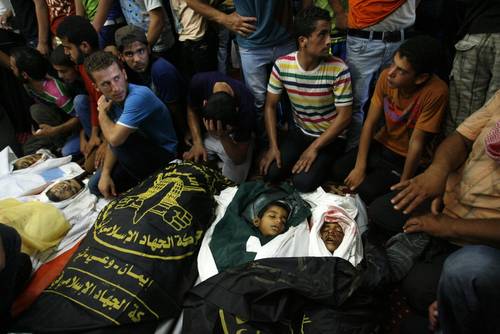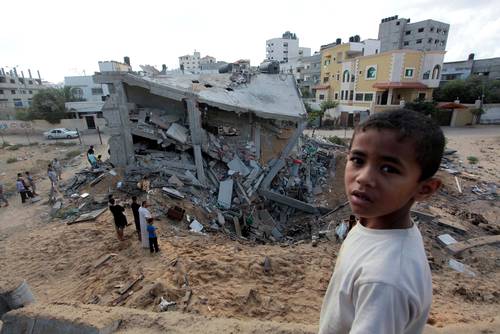Both Israelis and Palestinians were surprised by the news of the kidnapping of three young israeli settlers on 12 June 2014, near the Gush Etzion settlement in the West Bank, especially because no political or military entity declared responsibility for the incident.

Both Israelis and Palestinians were surprised by the news of the kidnapping of three young israeli settlers on 12 June 2014, near the Gush Etzion settlement in the West Bank, especially because no political or military entity declared responsibility for the incident.
Because no Palestinian group stated an official position, local Palestinian media at first expressed serious doubts about the authenticity of the Israeli claim. One electronic media source suggested that the whole case was nothing more than a story fabricated by Israeli security agencies seeking an excuse to pursue members of the Palestinian resistance in the West Bank. But the Israeli Web site Walla announced that it received an official statement from the radical Islamic organization ISIS claiming responsibility for the kidnapping. A few days later, Palestinian media relayed an official statement from the Palestinian military group al-Aqsa Brigades claiming responsibility for the kidnapping.
The government of Israel soon took an official position accusing Hamas and its members of the kidnapping. It ordered the launch of The Return of the Brothers operation in various cities of the West Bank in June 2014. The operation concentrated on Hebron, and the Israeli army surrounded the city and prohibited its people from traveling.
The primary objective of the military actions in the West Bank was to dismantle the infrastructure of Hamas by arresting as many members as possible under the pretense of searching for the three settlers and their kidnappers. On 30 June 2014 the Israeli police announced that they had located the bodies of the three settlers in the Halhoul area, north of Hebron.

Palestinian Response
During the Israeli search, Palestinian reactions varied between support for the kidnapping, because they saw it as an opportunity to bargain for the release of jailed Palestinians in Israeli jails, and rejection of the kidnapping, because they believed that peaceful resistance and negotiation are the only way to secure the release of the Palestinians prisoners. Nevertheless, the reactions of all Palestinians indicated their increasing anger toward Israel, as the majority of them consider Israel an occupying state and hold it responsible for the suffering of the Palestinian people.
Hamas praised the kidnapping through its political office, headed by Khaled Mashaal (now based in Qatar), who stated, during an interview with Aljazeera TV, that Hamas favors any effort that may result in freedom for the Palestinian prisoners. Although he did not officially sponsor the kidnapping, he saw it as an opportunity to pressure the Israeli side for the release of Palestinians, as had happened previously in the Shalit deal, which led in 2011 to the release of 1027 Palestinian prisoners in exchange for the kidnapped Israeli soldier Gilad Shalit.
The position of Fatah contrasted fundamentally with Hamas: Mahmoud Abbas, president of the Palestinian Authority and head of Fatah, strongly condemned the kidnapping and emphasized the importance of security coordination with Israel as the best way to find the missing settlers. He also threatened whoever was responsible for the kidnapping. Abbas considered the kidnapping harmful to Palestinian reconciliation, possibly creating chaos and uncertainty throughout the West Bank, providing the Israelis with a further excuse to occupy more Palestinian territory and expand their settlements.
Abbas’s position on the kidnapping was no surprise to the Palestinian people and Palestinian political parties, particularly because Abbas is adamant in his belief that security cooperation with Israel is sacred, a position he restated when he was visited by a delegation of young Israelis at his office in Ramallah in May 2014. Abbas’s statement angered many Palestinian youth and members of Hamas who were harshly critical of Abbas‘s ideas about peace, describing his speech as weak and defeatist. This criticism of the policy of Palestinian president indicates that Abbas’s popularity has been greatly diminished in the Palestinian street.
The kidnapping of the three settlers indirectly affected Palestinian reconciliation after the signing of the agreement in April 2014. Unease, friction, and a lack of trust between Hamas and Fatah became evident, to the point where accusations were exchanged when members of Fatah accused Hamas of purposely sowing the seeds of chaos and unrest in the West Bank in preparation for a third uprising (intifada), in an attempt to dismantle and eliminate the role of Palestinian Authority in the West Bank. Hamas strongly rejected that accusation, stating that the newly formed government was isolated from the reality on the ground and was not meeting its responsibilities to manage the affairs of Gazans and relieve their suffering. Hamas claimed that approximately 40,000 government employees from the previous Hamas government were going without pay, that the Rafah crossing with Egypt was still closed, and that Gaza was isolated, with no real attempt by the newly formed government to ease suffering and improve conditions. Mousa Abu Marzook, one of the leaders of Hamas, requested on his Facebook page that the newly formed government fulfill its responsibilities toward the people of Gaza and threatened that the failure of the government might force Hamas to form a new body of nationalists to administer the affairs of Gaza, a move that would ultimately dissolve the new national government.
Palestinian Reconciliation Complicated

With the increase of unrest in the West Bank as a result of the kidnapping and with the economic situation Gaza worsening every day, a new clash between Hamas and Israel broke out when the government of Israel announced, on 8 July 2014, the launch of its Protective Edge operation, in retaliation for the increased number of rockets launched by the Palestinian resistance from Gaza into Israel. This brought about an escalation between Hamas and Israel and led, according to the data of Palestinian Ministry of Health, to the deaths of more than 500 people in Gaza in the first two weeks, women and children among them, and causing extensive damage to Palestinian homes.
The Israeli military offensive took a toll on Palestinian unity and reconciliation, because President Abbas was unable to convince Hamas to stop firing rockets into Israel, a clear indication of the deep political rift between the two sides that appeared after Abbas condemned the kidnapping of the three settlers.
One of the main issues leading to the friction between Hamas and Fatah is that of the unpaid salaries for the employees of the previous Hamas government. The Palestinian Authority was reluctant to pay because of the scrutiny by the donating countries who prohibit the transfer of money to those affiliated with Hamas, which is considered a terrorist organization by the United States and the European Union. All the branches of Palestinian banks located in Gaza still refuse to accept funds from Arab donor countries such as Qatar, for fear that it will go to the employees of the previous government of Hamas. This failure to pay salaries owed caused a backlash by the employees who had gone six months without pay. Some attacked banks and ATM machines in order to obtain their salaries.
The closure of the Rafah crossing for more than a year is another vital issue that has harmed Palestinian unity and reconciliation, because the newly formed national-unity government failed to persuade the Egyptian government to open the crossing.
Although the kidnapping in the West Bank hurt the relationship between Hamas and Fatah, it did not directly affect Palestinian reconciliation. The kidnapping was an irritant to both sides, but the issues of unpaid salaries and the Rafah crossing remain most important.
In spite of the unrest and military escalation in the West Bank and Gaza, serious efforts were made in mid-July to salvage the reconciliation between Hamas and Fatah. Palestinian factions held Israel responsible for the failure of reconciliation, as was evident when the military spokesman of Hamas, Abu Obaida, demanded, as a condition for a ceasefire, that Israel not attempt to sabotage Palestinian reconciliation. Since the announcement of the reconciliation, the Netanyahu government has spared no effort to attack all attempts to achieve Palestinian unity. Israel asked Abbas to withdraw from any agreement with Hamas, accusing him of supporting terrorism because he engaged in a unity deal with an organization that Israel held responsible for the kidnapping of the three young settlers. These accusations and threats were rejected by Abbas, forcing him to announce his position on Palestinian national reconciliation, regardless of his problems with some members of the Hamas leadership.


